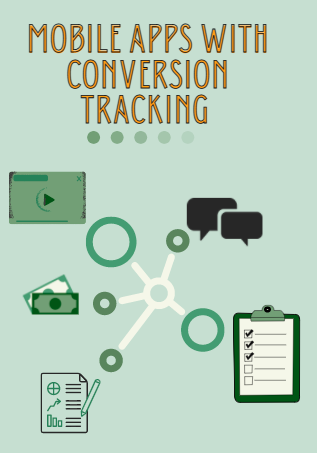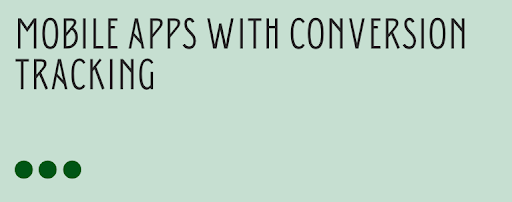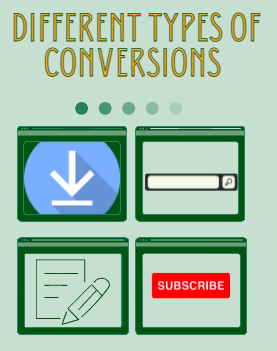
Each business platform, to serve the organizational goals, may be optimized to generate more leads, increase revenue, and enhance conversion performance. More specifically, there are numerous mobile apps with conversion tracking systems that make optimizing campaigns easier. While businesses may opt into particular systems to enhance conversion tracking, these systems may also serve dual purposes such as including analytics and reports for admin users, responding to user inquiries with precise labeling and activity tags, and being managed by multiple users to scale up conversion goals and budget parameters.
Depending on which conversion tracking system is needed for your business or ad campaign, there are various technologies, compatible with mobile applications, that may significantly positively benefit your company. For assistance integration and optimization of campaign tracking systems, businesses may reach out to a local Los Angeles mobile app development agency like https://sunlightmedia.org/services/mobile-app-development/.
Different Types of Conversions
While companies may have different goals, they deploy specific systems to optimize their conversions. Different conversion types may be tracked to later review and optimize. For example, there are “clicks,” which measure user clicks for each ad and “impressions,” which are how many times an ad appears on a user’s search results. These two metrics may be used to measure Click Through Rates (CTR), which identifies ad effectiveness with target audiences. Ads may also measure Cost Per Click (CPC) which offer insights on average bidding parameters with competitors. For a more in depth understanding of conversion tracking and its benefits, businesses may review why ROAS matters in digital marketing.
Other conversions may include Top Impression Shares (IS), which measures events when ads are placed on the top of ad placements on search results. To add, bounce rate, page and sessions, and session duration may prove useful for businesses seeking more precise measurements in regards to user behaviors, interactions, and activities. These in-app metrics also serve helpful for users seeking improved solutions for raising engagement levels. Certain conversions and the costs and budget for tracking these metrics effectively determine which systems provide positive returns to overall conversion rates, leads, or search engine optimization (SEO).
Mobile Apps with Conversion Tracking

Cliengo
Cliengo, when paired with Ad management systems, offers businesses the necessary tools to track user activities and interactions on mobile applications. The mobile app is available on both Android and iOS platforms and offers responsive chatbot systems that may record client details. While the mobile application captures contact information from external users, other technologies offer administrative and marketing teams to enhance the chatbot system for improved user experience, upselling of sales, and communicating with clients with personalized messaging templates.
The Chatbot system may be modified further to include relevant color schemes, brand logos, and provide relevant links to inquiries associated with companies frequently asked questions (FAQ). In return, users interacting with Cliengo integrated systems may better navigate to resources and brand lead forms to drive more overall conversions.
When paired with a Google Ad manager like Google Analytics, the system may relay user activities and interactions to provide businesses and marketers insights. A tracking script code may be placed within the settings of cliengo’s admin console to pair the two systems, which in return will enable users to configure event tracking configurations best suited for each businesses conversion goals. This means that marketers may track details such as the frequency of how often users are opening, starting, messaging, and proceeding with purchases or services through the widget.
Google Ads
As a popular Ad conversion tracking system available on both Apple and Google Play app distribution stores, Google Ads allows users the opportunity to deploy, measure, and manage mobile app conversion forms easily and effectively. Users may create app Ads with images and videos, target cost per install daily budgets, and record goals within the conversion tracking system. Goals may record events when users install or download mobile apps or perform specific user actions such as subscribing to services, purchasing products, filling out lead forms, and more.
Through the use of search, display, video, shopping, and discovery ad campaigns, businesses may optimize their products, services, and content to appear more frequently on search results and app stores. Additionally, Google ads campaign setup features allow users to capture target audience attention with banner ads, increase video view with video ads, browse and shop various products local to their region, and expand target audiences with discovery ad campaigns.
The smart bidding technologies included in Google Ads accounts make optimizing budget spending automated to accommodate different business ad budgets. Other automation systems include auto rotation of active ads and account alerts. The Google Ads platform is also user-friendly and provides numerous helpful resources and support for additional assistance in campaign setup of third-party integrations.
Facebook Ads Manager
Facebook Ads Manager on the Apple and Google Play store allow businesses and marketers to optimize their ad creation and spending to raise conversions. There are numerous different functionalities within this mobile program, which includes campaign listings, account overview reports, performance chart updates, campaign insight and user-friendly navigation functions.
With the Facebook Ads mobile application, comparing results from different campaigns, scheduling ads, adjusting budgets, data analysis, and keeping technologies up-to-date are quick and easy. Users may set specific target goals, such as tracking events for conversions when users download apps, products, or subscription services. For the benefit of the user, the ad manager also enables users to monitor, edit, manage, and gather insights from other third party social apps while obtaining alerts on active campaigns.
Mailchimp
With built-in campaign building capabilities, the Mailchimp mobile app offers various conversion tracking abilities useful for different enterprises. Available for both iOS and Android platforms, the Mailchimp platform allows users to set up specific app and landing pages with the necessary lead forms, purchasing functions, subscriptions signups, and social media sharing options.
Due to the design, functionality, and responsiveness of the Mailchimp system, users may view reports, edit or create campaigns, and define remarketing goals and actions quickly and easily. For additional functionality, there are automation systems that make responding to users’ inquiries, sending notifications and reminders, and sharing analytics and event conversions with administrator dashboards more simple.
Upon development of app ads, goals, and lead and conversion forms, marketers may use the data to view user activities, behaviors, and campaign performance while reviewing conversion rates, insights, and budget ad performances to further optimize existing and active campaigns. More specifically, businesses may track each conversion from within the reports dashboard in Mailchimp to determine the effectiveness of campaigns for revenue, click-through-rates, app downloads, subscribers and more.
Bitly
Along with the common core functionalities of the Bitly system, the mobile application provides numerous conversion tracking benefits to significantly enhance campaign optimization positively. Upon integration of the mobile application and link setup, marketers may monitor, manage and optimize numerous different data sets such as mobile app sessions, page visits, purchases after link clicks, redirects, and more.
Paired with a system like Google Analytics, the Bitly software may be modified with the traffic and campaign tracking tools to manage conversion campaigns with specific event parameters. These analytics may be reported for different marketing channels and social pages, each campaign, and each different content article, post, and advertisement. Tracking these links on conversion forms makes understanding brand target audiences easier while enabling marketers to expand their operations to raise more revenue, generate more leads, increase engagement levels, and more. Bitly is currently available for both iOS and Android platforms.
Localytics
With Localytics push API technologies, Apple Store users may run real-time push notifications to their target audiences for improved marketing performances. When considering which platforms to opt-into for raising and measuring user engagement levels for both existing and new audiences.
In more detail, the push notifications may be geo-based and consist of various notifications that alert users about events when products and subscriptions are used for a specific duration, cart purchases are made, items are removed from cart, or users search for items within different locations. Marketers with Localytics may place goals within their dashboard to collect data and track conversions more accurately.
Flurry Analytics
Flurry Analytics provides Mobile app conversion tracking for businesses seeking reliable and user-friendly software that optimize campaign performance. The mobile application is available for both the Apple and Google Play store and consists of an intuitive dashboard for tracking ap[p activity, conversion performance, and configuring ad events to stay up-to-date with different target audiences preferences.
With Flurry analytics, the administrator may assign team member roles, set up account and user notifications for campaign management and engagement purposes, and review real-time metrics for campaign and conversion performance optimization. For more in-depth conversion tracking data, marketers may use specific ad tracking functions, such as responding to users that meet the appropriate demographics and app activity progress.
Conclusion
In conclusion, businesses may use mobile apps with conversion tracking functions to optimize campaigns while reviewing data to manage productivity and budgets for ad and conversion setup. Marketers may apply the necessary goals and event parameters within mobile conversion and ad tracking apps to filter the data being collected. As a result of the optimized campaigns, target audiences may view conversion forms and activities that are more relevant to their specific preferences, which in return, leads to increased revenue, higher user engagement levels, and better managed ad campaigns.

Bio
Jhonathon Badalof works at Sunlight Media LLC in Downtown Los Angeles, California. As a Project Manager, Jhon collaborates with clients on website and app design and development, marketing, and creative solutions for campaigns. In addition to Project Management, Jhon is a content writer who writes articles that rank well on Google and other social media platforms. His skill sets include social media marketing, eCommerce, brand development, programming, web design, and graphic design.




